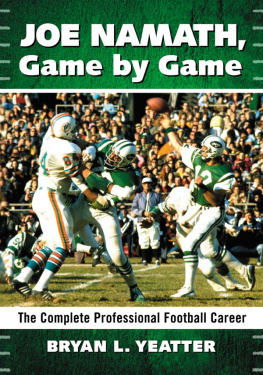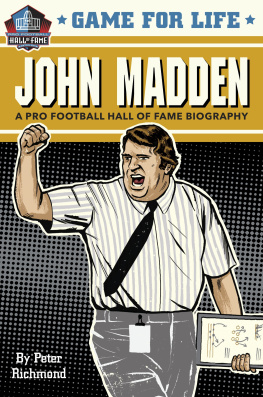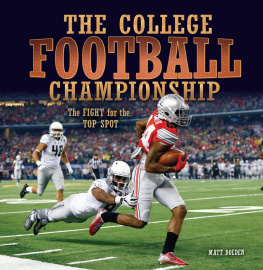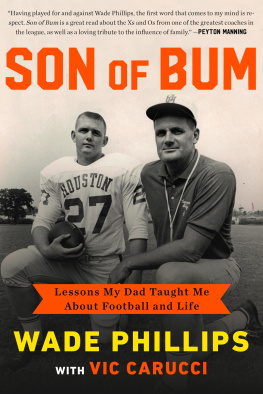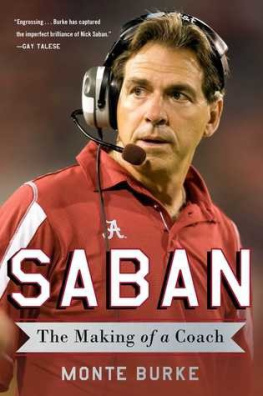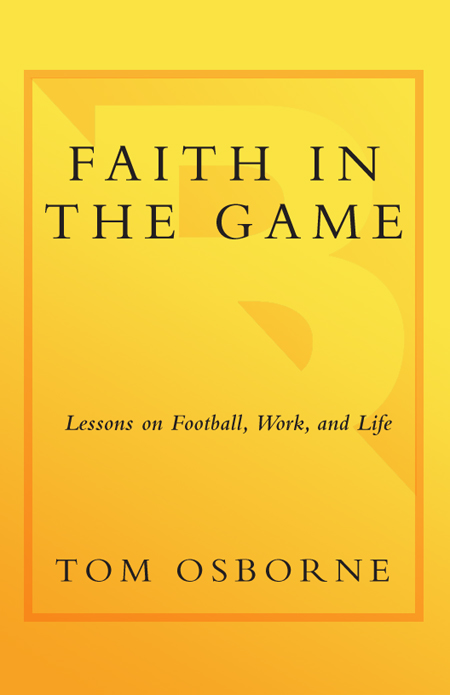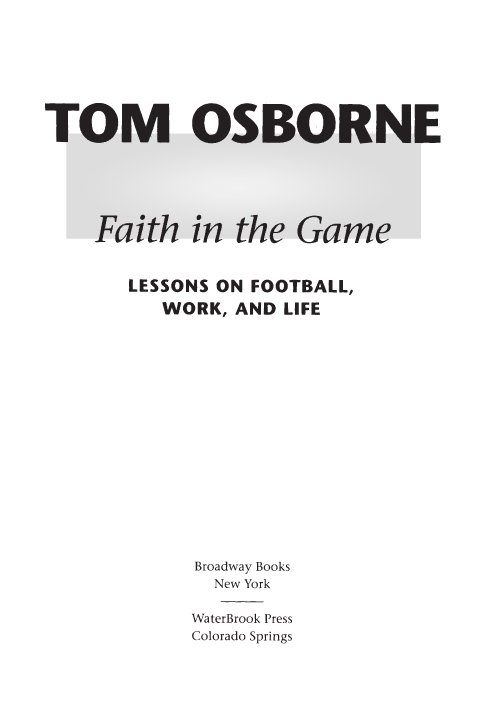I would like to thank my wife, Nancy, and my children, Mike, Ann, and Suzanne, for gracefully bearing the burden of having a husband and father who was too often in the public eye and too often gone. I would also like to thank the University of Nebraska coaches and players who taught me so much about competition, discipline, and caring. My student assistant, Leslie Barnes, provided invaluable help in putting this book together. Rita Ude, my assistant, was very helpful typing and correcting the manuscript. Both Leslie and Rita were able to make it appear that my command of the English language is considerably better than it actually is.
Introduction
In July 1997, I informed Frank Solich, my assistant head coach, that I anticipated the 1997 season would be my last. I had made some personal and professional commitments contingent upon stepping aside as head football coach for the University of Nebraska Cornhuskers that I believed needed to be honored. My major concern, however, was whether or not the university administration would promote Frank to the head coaching position. If there was a desire to hire from outside the staff, I would not resign, as I believed strongly in the importance of staff continuity. I did not want to leave the coaches and players with a new coach who might make changes in staff or philosophy that would be disruptive to the program.
Early in the season, I met with Bill Byrne, our athletic director, and James Moeser, the chancellor of the University of Nebraska-Lincoln, to share what I was thinking. They seemed surprised by my decision to step aside and asked that I give it further thought. They did not, however, express any serious objection to the possibility of Frank's being named head coach.
As the season unfolded, I experienced conflicting emotions. I felt that it was important to do what I had said I was going to do, yet I kept hoping that something might come up that would necessitate my staying on. I wasn't ready to quit, yet I didn't feel right about committing to something and then not following through. Each game we played, each stadium we visited, had special meaning. Rather than coaching each game to try to win it and get it behind us, I found myself paying more attention to the physical setting, the preparation of the players as they taped, dressed, and went through their pregame rituals. I also was more aware of my emotions as the time for another kickoff approached. It was an eerie feeling to know that something that had been such a big part of my life was drawing to a close, yet the season continued to unfold with the same rhythms that so many others had.
I could relate to what former Michigan coach Bo Schembechler wrote after his last season:
Take a good last look. I whispered to myself. Fans were cheering and throwing roses. My players were slapping hands as they counted down the clock. NINE! EIGHT! SEVEN!
Take a good last look. Somehow, on that field, at that moment, with the Big Ten title about to come our way, with another trip to Pasadena guaranteed, with my guys sweaty and bloody and whooping it up and the whole stadium on its feet SIX! FIVE! FOUR!somehow, I knew I would never be back.
This would be my last game at Michigan Stadium.
I knew what Bo was talking about. Each game that we played was poignant for me, as I knew that I would not be coaching a Nebraska team against that opponent again.
Our game against the University of Missouri on November 8, 1997, was particularly memorable. We were trailing by a touchdown late in the game and Missouri had the football. We finally forced them to punt and gained possession of the football with less than a minute remaining and no time-outs left. Our quarterback, Scott Frost, orchestrated a drive that culminated with a great diving catch in the end zone by freshman Matt Davison. The ball bounced off another receiver, Shevin Wiggins, was kicked in the air, and Matt dove and barely got his hands under the ball to tie the game. We went on to win 4538 in overtime. It was a miraculous win that enabled us to remain undefeated with a chance of still winning the national championship.
Sometime during the week following the Missouri game, I noticed something was physically wrong with me. I normally jogged three miles after practice or spent thirty minutes on the StairMaster. I found that I could get only halfway through a workout and then became so fatigued I could no longer continue. The first time this happened, I rationalized it by reflecting on the fact that I had been putting in long hours and was a little tired. Then it happened the next night and the next, and I knew that something was really wrong.
I made it through the rest of the week. We beat Iowa State soundly in our last home game, on Saturday, November 15. When we introduced the seniors to the crowd and they ran out on the field for the last time in Lincoln, a great many had tears in their eyes. I had a few in mine, as well. I got through the postgame interviews, did my TV show, and then checked myself into the Bryan Hospital emergency room at about ten o'clock that night.
It didn't take long for the doctors to diagnose my problem as atrial fibrillation, a condition in which the upper chamber of the heart beats erratically and does not empty properly. The condition was not immediately life-threatening but could result in a blood clot or stroke if left untreated. The next morning I was given an anesthetic and Dr. Krueger, a personal physician, was able to shock my heart back into a normal rhythm. I returned to work later that afternoon but was still pretty weak.
This was a significant event, because I took it as part of the answer to the question of what I needed to do in regard to stepping aside. The doctor had said that the atrial fibrillation would probably reoccur at some point, was likely related to stress, and sometimes becomes a permanent condition that one must learn to live with.
I prayed about what I needed to do and could never feel comfortable spiritually with any solution but to quit coaching. It seemed I was being told that it was time to do something other than coach. Having already had heart bypass surgery 12 years earlier, I took the latest episode with my heart as the final answer to my dilemma. Part of me wanted to stay in coaching, but from that point on I knew that my coaching days at Nebraska were about over.
I met with Bill Byrne and Chancellor Moeser again a few days before our Big 12 playoff game with Texas A&M on December 6. I told them that I was sure the right thing for me to do, at this point in my life, was to step aside.
I once again expressed to them my confidence in Frank Solich. Frank was stable, well organized, and a good communicator. He knew football and knew what would work in Nebraska. I was sure that Frank would hold the staff together and would take good care of the players. Fortunately, there was no administrative disagreement.
On December 10, 1997, I informed the coaches during our morning staff meeting that I was leaving and that Frank would be taking over. I told the players later that afternoon, and a short while later I held a press conference officially announcing the change. This was, without a doubt, the longest day of my coaching career. I loved those players and coaches; telling them I was leaving was very painful.


